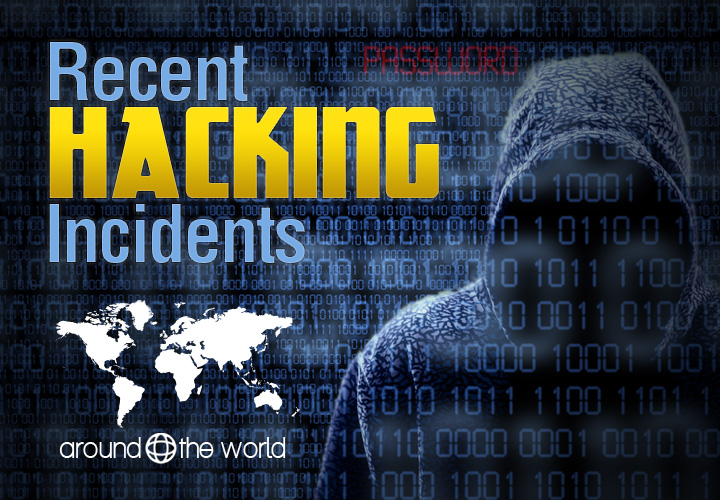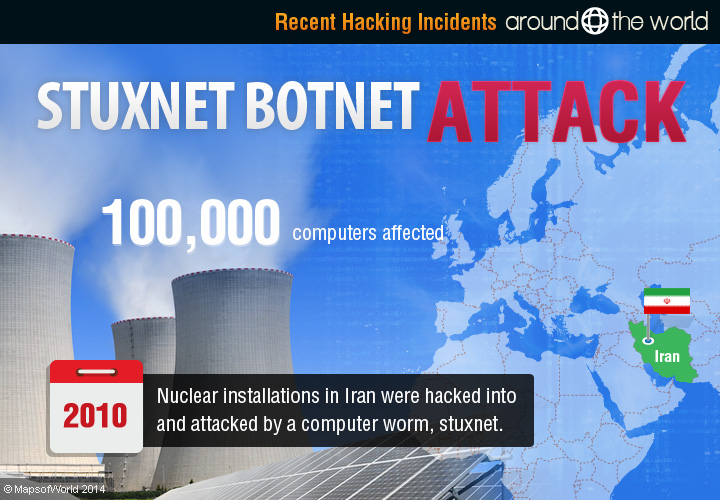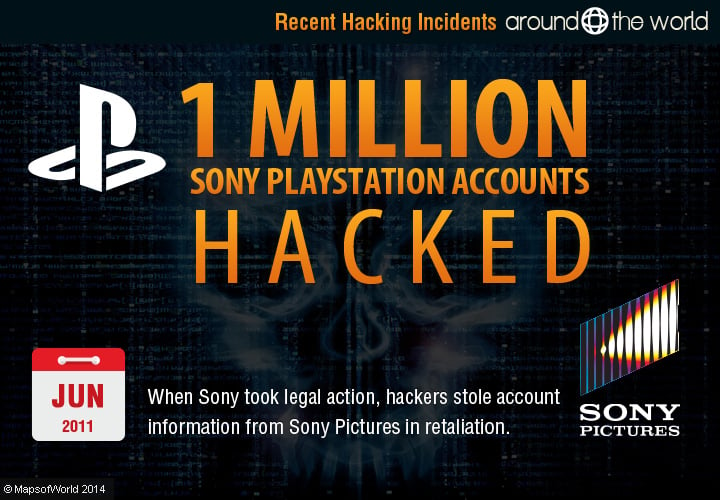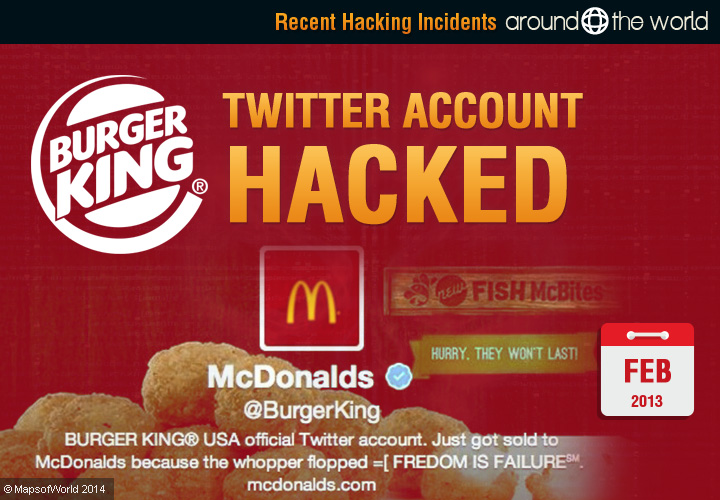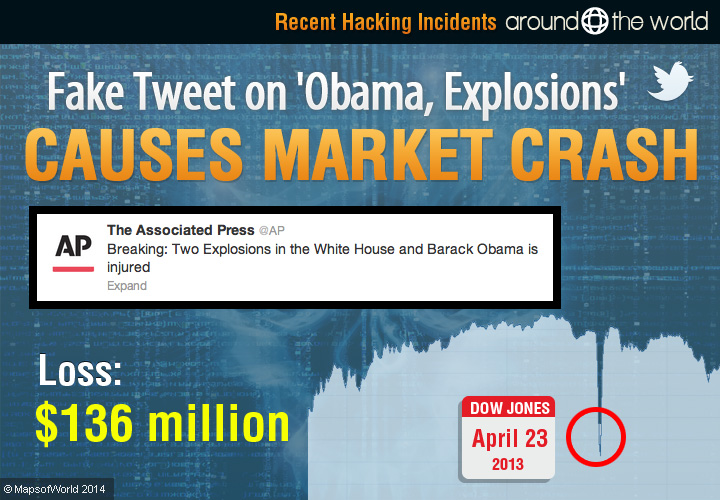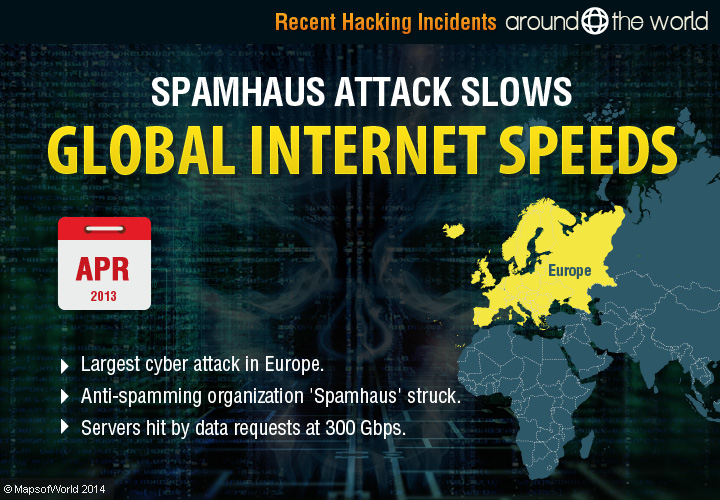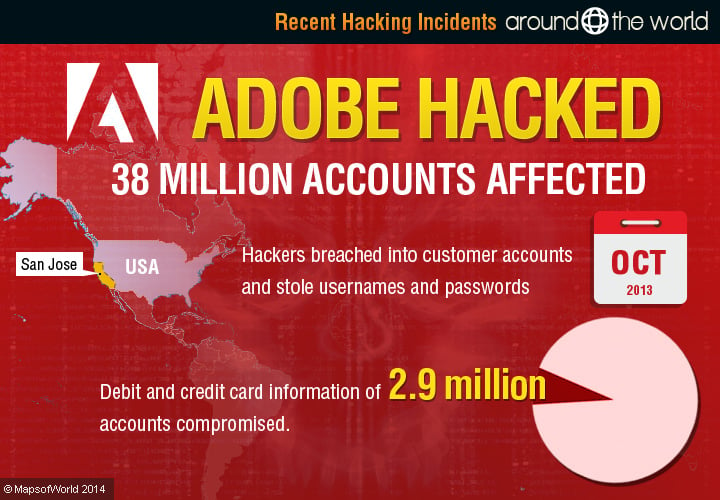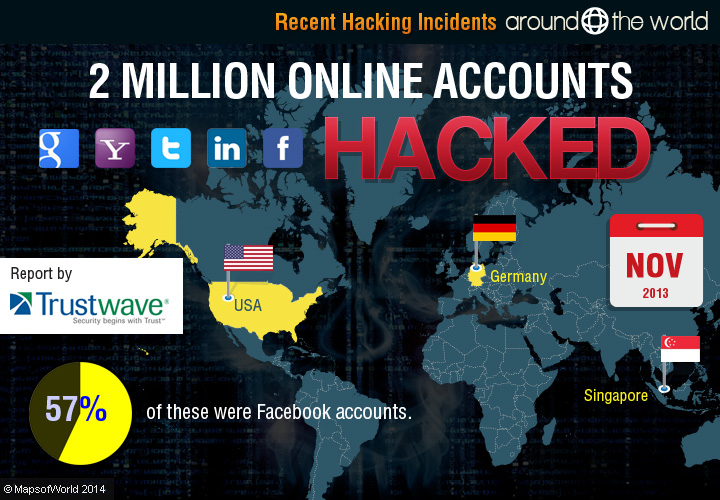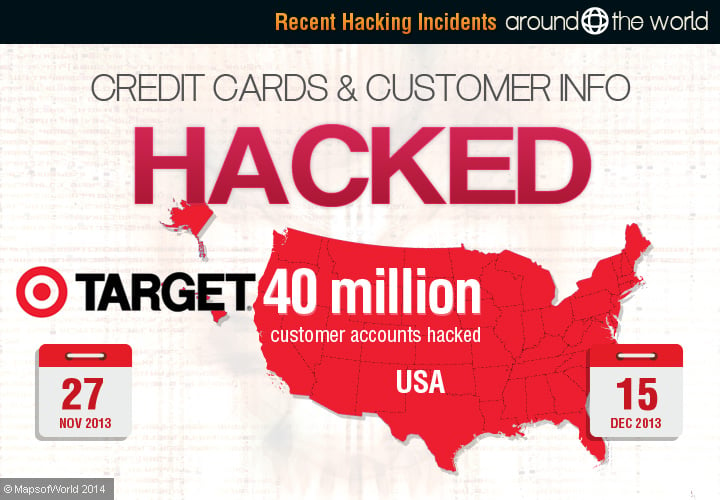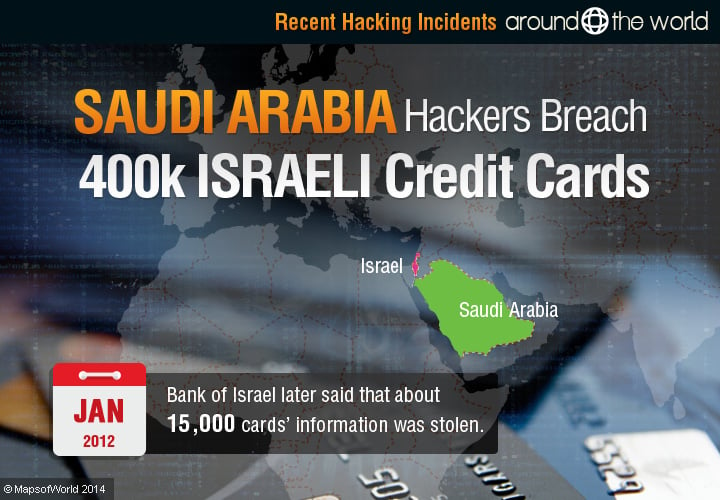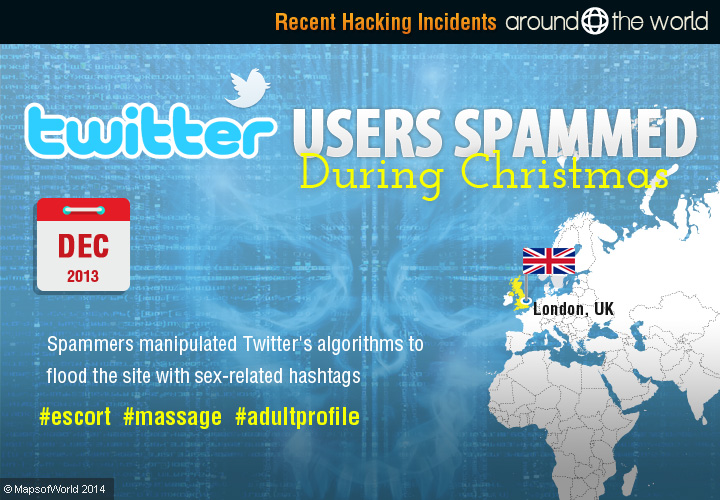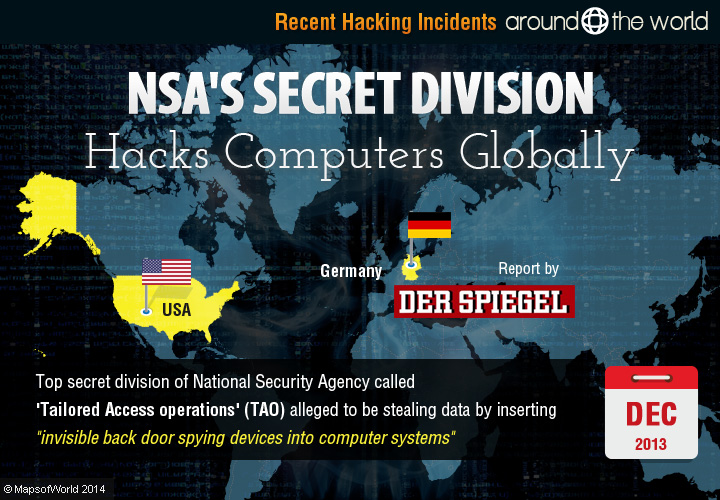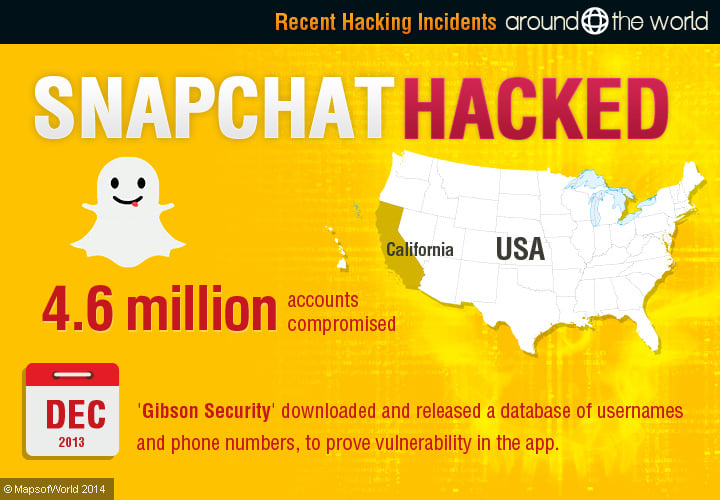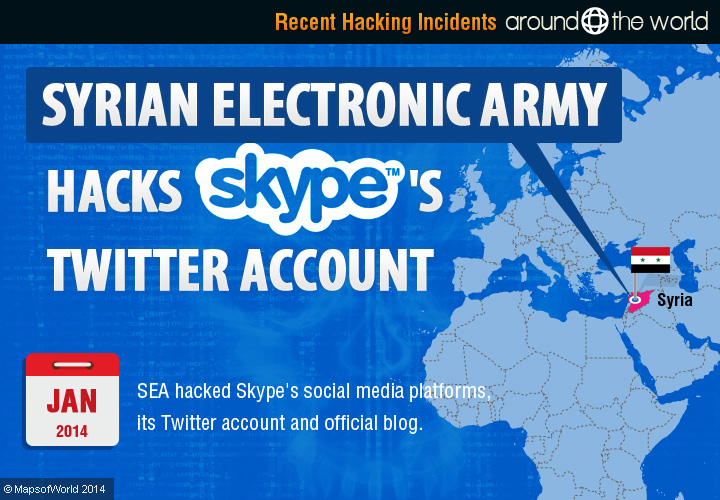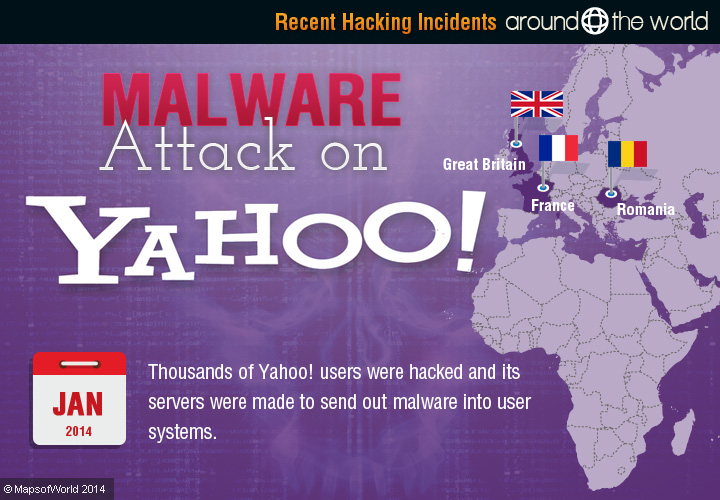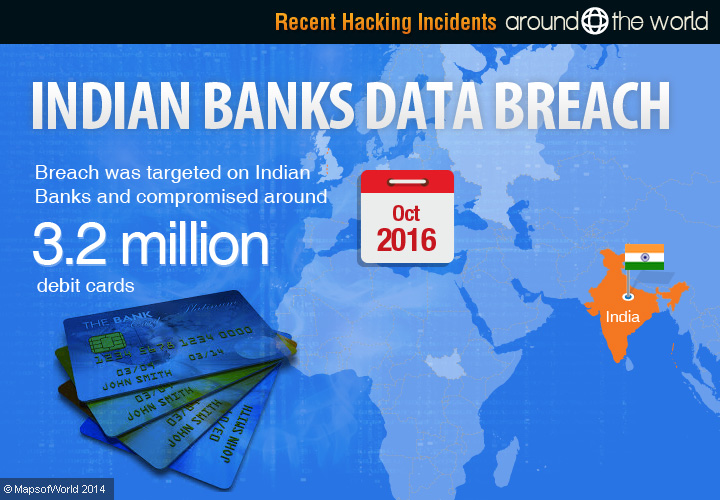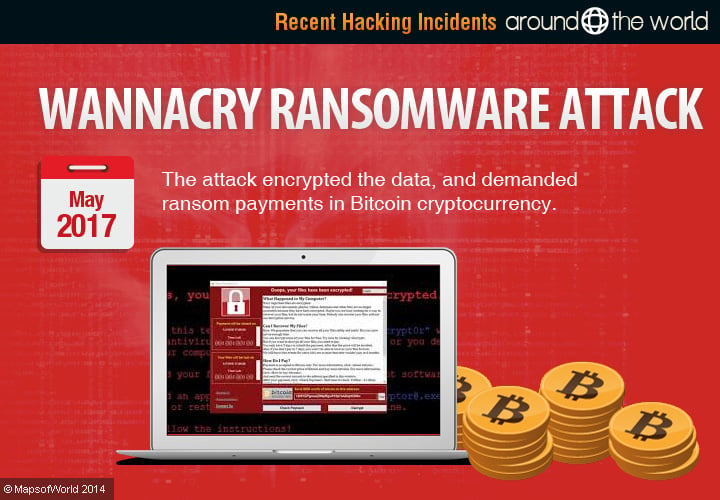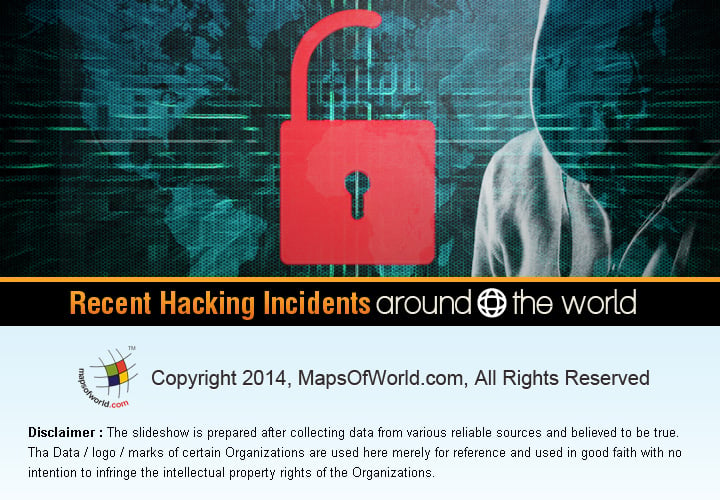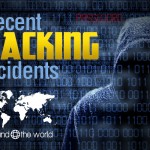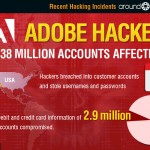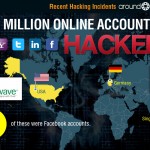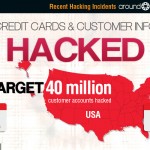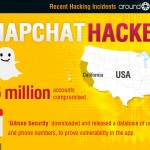Recent Hacking Incidents Around the World
Several hacking incidents have recently rocked the technology and Internet world. In today’s modern world, with the prolific use of computers and high-tech softwares, modern-day hacking too has become somewhat of a phenomenon. The latest malware cause damages in millions, private data gets hacked and millions of customer information accounts compromised. We list a few of these that have caused damages in millions to account holders and companies worldwide:
WannaCry ransomware attack 2017
Hundreds of thousands of computers around the world were affected by WannaCry ransomware attack in May 2017. The attack, which took place on Friday, May 12, 2017, affecting more than 200,000 computers in around 150 nations across the globe, targeted only those computers that had the Microsoft Windows. The attack not only encrypted data, but it also demanded ransom payments in Bitcoin Cryptocurrency.
Indian banks data breach 2016
This breach took place in October 2016, compromising around 3.2 million debit cards. It mainly targeted Indian banks and some of the worst affected were HDFC, Yes Bank, ICICI, SBI, and Axis Bank. Even in certain areas in China, people reported the unauthorized use of their cards. It had serious consequences as banks took to a major replacement drive, which is considered as the biggest in the history of India till date. According to reports, the breach was as a result of a malware that was injected into Hitachi Payment Systems’ payment gatewaynetwork.
Malware attacks on Yahoo! (January 2014)
In January 2014, thousands of Yahoo users on a per hour basis were attacked by hackers. Yahoo’s servers made to send out malware called “exploit-kit” into user systems, according to Fox-IT, a cyber security and defense firm based in Netherlands.
During the first week of January 2014, Yahoo users were hacked when advertisements began to appear on December 31 on its site and these were finally removed on January 3. By then, the damage had been done and several thousand computers had been hacked in Romania, France, and Great Britain. Yahoo ruled out attacks on Mac and mobile device users in North and Latin Americas and the Asia Pacific region as well.
Syrian Electronic Army Hacks Skype’s Platforms (January, 2014)
Skype’s social media platforms such as its Twitter account and Skype’s official blog were hacked on January 1, 2014, by a group called the Syrian Electronic Army or SEA. SEA also posted a message asking users not to use email services of Microsoft, which owns Skype, as “they are monitoring your accounts and selling the data to the governments.” However, actual accounts and passwords were not affected. The SEA is known to be loyal to President Bashar-Al-Assad and has defaced websites all over the world in the past.
Snapchat Hacked in Dec 2013-Jan 2014
Snapchat, which rose to be one of the most popular smartphone apps of 2013 and a photo-sharing service, suffered hacking that exposed its vulnerabilities. Snapchat’s app FindFriends was hacked temporarily by a security firm, Gibson Security, which downloaded the user names and phone numbers of about 4.6 million accounts. This was done by the firm to prove the app’s vulnerability to hacking.
In its report published on December 25, 2013, the security firm highlighted the flaw in the app. A website SnapchatDB later released the vast database, which included user names and phone numbers of Snapchat users in the US. Snapchat, having denied the shortcomings in its app earlier, on January 2, 2014, admitted to the flaw and said that it will try and improve the functionality of the Find Friends app of Snapchat.
TAO Division of NSA Hacks Computers Globally (December, 2013)
A top secret division of the National Security Agency in US called Tailored Access Operations (TAO) was alleged to be stealing data and inserting “invisible back door spying devices into computer systems”, as per the German magazine Der Spiegel.
The magazine reported that TAO was an elite team of specialist hackers who gained undetected access to some of the toughest intelligence targets that could not be penetrated through other spying techniques, and described its mission as “getting the ungettable”.
London Twitter Users Spammed During Christmas (December, 2013)
Users of Twitter in London were flooded by a Christmas spam attack using sex-related messages. Spammers manipulated Twitter’s algorithms by flooding the site with hashtags including #escort, #massage, and #adultprofile.
Target Credit Cards and Customer Info Hacked (Nov-Dec 2013)
US discount retailer Target found that 40 million of its customer accounts were hacked during November 27-December 15, 2013. Across the US, during Black Friday, the Target stores were targeted and customer names, credit cards, debit cards, and cvv values of several customers were hacked. The retail major said that other information such as addresses, PIN, social security numbers, etc., were, however, not hacked.
Target CEO Gregg Steinhafel indicated that “the cause of this issue has been addressed and you can shop with confidence at Target.” However, the mystery surrounding the hacking issue remains, as he did not confirm how he knew customer data was no longer being stolen or how the hackers actually managed to swipe the credit card data. Since then, Target’s revenues have significantly gone down.
A 17-year-old Ukrainian boy was reported to be responsible for writing the Target breach. The president of IntelCrawler suggested that the teenager wasn’t directly involved in the crime at the store. “The real bad actors responsible for the past attacks … were just his customers.” The boy is a well-known hacker, who developed the program known by several names such as KAPTOXA, in 2013. The intelligence firm also mentioned that about 40 cybercriminals have bought the program.
Nearly 2 Million Online Accounts Hacked in November 2013
In December 2013, it was widely reported that Trustwave, an Internet security firm, had come out with its report that more than 2 million online accounts in Google, Yahoo, Twitter, LinkedIn, and Facebook had been hacked by hackers using Pony malware. These hackers successfully stole the user names and passwords of users in the US, Germany, and Singapore. About 57% of these accounts were of Facebook. The reason was attributed to weak passwords used by users.
Adobe Hacking – 38 Million Accounts Affected (Oct 2013)
About 38 million Adobe customer accounts were reported to have been breached by hackers in May 2013, when the source code of Adobe’s popular Photoshop program was hacked and parts of the code stolen. This helped the hackers breach into the customer accounts and steal data related to their IDs and passwords. The breach was first reported by Brian Krebbs, a security blogger. In case of 2.9 million accounts, the debit card and credit card info was also hacked.
The SpamHaus Attacks (Geneva, London, Europe)(April 2013)
2013 witnessed several hacking attempts – the largest cyber attack happened in Europe when anti-spamming company Spamhaus was struck by a Dutch affiliated to a company called Cyberbunker and global internet speeds slowed dramatically. At the peak of the attack, the servers were hit by data requests in the range of 300 Gbps.
Fake Tweet on ‘Obama, Explosions’ Causes Market Crash
An Associated Press email and twitter account was hacked after a phishing attack by the SEA group, which then sent out a false tweet about “2 explosions resulting in Barack Obama getting injured.” While the White House and AP issued statements about the bogus tweet, the US stock market took its fastest ever hit as it lost more than $136 million as it crashed on the false news. The stock market crashed was later attributed to a ‘tradebot’ sent from computers to read any ‘breaking news.’
Burger King Hacking (US) (Feb 2013)
The Twitter account of Burger King was hacked with cyber hackers posting a series of fake tweets that Burger King had been sold out to McDonalds. The outcome however was positive – Burger King twitter account gained 5,000 more followers in the first half hour within the attack – and then Twitter pulled down this account.
Saudi Arabia Hackers Breach 400,000 Israeli Credit Cards (Jan 2012)
About 400,000 Bank of Israel credit cards were breached by a group claiming to be from Saudi Arabia. However, the bank later said that about 15,000 cards’ information was stolen. The hackers also threatened to publish the remaining hacked cards’ information.
Sony Pictures and Playstation 3.0 Hacking (June 2011)
Sony PlayStation accounts: About 1 million were hacked by hacker George Hotz. Sony took legal action against him and in retaliation the group Lulzsec, headed by founder Sabu, hacked into Sony Pictures accounts. Data including usernames, their passwords, addresses and email IDs were stolen. Sabu ultimately pleaded guilty, turned an FBI informant and helped arrest 5 more member hackers.
Stuxnet Botnet Attack (2010)
A classic case of industrial espionage, nuclear installations in Iran were hacked into and attacked by a computer worm, stuxnet. It affected nearly 1,000 of the 5,000 centrifuges that Iran had at that point in time, used for purifying uranium. Worldwide, more than 100,000 computers were said to have been affected. This worm was said to be created by US and Israeli coders to counter and derail Iran’s growing nuclear strength.

